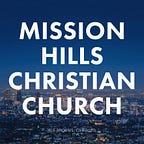Why Our Church Doesn’t Have An American Flag
A few years ago, I walked into the lobby of a church during the week of July 4th. For me, it was simply another Sunday and I was completely unprepared for what was coming next. I was finding my seat as the music begin to play and I instantly cringed as everyone stood to proudly sing “God Bless America.” Every song that Sunday was patriotic. The choir sang every armed services anthem, and of course, red, white, and blue banners adorned the sanctuary. Unfortunately, this type of church service is still not that uncommon in American Christianity. Even more traditional is the deeply cherished American flag that hangs at the front of many of nation’s churches. I once heard a story from a good friend who’s brother-in-law had recently graduated Seminary and was called to be the pastor of a church in Florida. During his first month, he decided to remove the flag from the sanctuary and the church immediately removed him as their pastor. The American flag is a powerful symbol to every American for a variety of reasons. I vividly remember when my family received a folded American flag from the Navy when my grandfather passed away. I remember the profound sense of patriotism after 9/11 when almost every house in the neighborhood flew the stars and stripes in their front yards and placed flag stickers on their cars. Despite being a meaningful national symbol, the American flag has no place in a church.
“The KKK stands for two of the greatest gifts that heaven has bestowed, namely the Holy Bible and the American flag…”
— A 1922 letter composed to a Methodist minister by 10 white-robed Klansmen
It is recognized that many churches began to display American flags during WWI. The flag was a way to test the loyalty of immigrant churches and their pastors to the United States. During the 1920s, the KKK was experiencing a revival based on their hatred toward immigrants and began using the American flag as a principal promotional symbol. It was common during this time for the KKK to pass out Bibles alongside American flags to churches. More churches are believed to have incorporated flags into the sanctuary during WWII as a way to honor and remember those at war. Patriotism soared in post-WWII America, and in 1954 Eisenhower added “under God” to the Pledge of Allegiance. Churches bought more flags.
“The tacit dominate narrative of our [American] society is military consumerism. It is propelled by greed and anxiety and violence. And that narrative is a lie. It cannot produce life.”
— Walter Brueggemann
Shortly after Jesus’ death, his followers were attempting to live the way of their Rabbi when Peter said, “Truly I understand that God shows no partiality…” Jesus spent his entire ministry teaching good news for the poor, healing those shamed by society, including those excluded by his religion, and loving those considered unlovable. In Acts, Peter recognized what was often misunderstood by the disciples: God loves everyone with no distinction. This is what Paul call God’s grace that “brings salvation to all people.” It’s vital for us to remember that God’s love is not partisan or American or anything but sheer grace for people of every ethnicity and nationality. Even as we celebrate the 1776 signing of the Declaration of Independence, we must remember Thomas Jefferson’s terrifying description of “merciless Indian savages” that follows “all men are created equal.” This declaration is a far cry from the opening words of Genesis that teach “God created humanity in God’s own image, in the divine image God created them, male and female God created them.” Nationalism of any kind is completely antithetical to the Christian faith. After all, the Nazi flag was commonly draped over the altars of Christian churches in Germany. As the Church, it is imperative that we embody Christ’s love for the marginalized, refugee, immigrant, and outcast. Jesus calls us to is a grace-filled life of neighborly love. At best, an American flag at the front of the symbolizes that the United States occupies a place of high value. At worst, it communicates who and what we really worship as Americans.
We do not have an American flag in our church, but we’re not free from the idolatry of nationalism either. I hope that as American Christians we will continue to be challenged by God’s radical love and grace has no boundaries and shows no partiality. May our spaces of worship also communicate this message.
